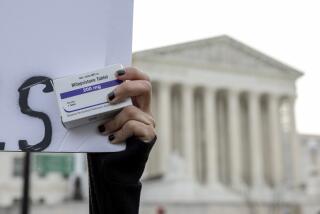FDA Begins Hearings on Safety of Painkillers
- Share via
WASHINGTON — The Food and Drug Administration on Wednesday opened what amounted to a medical trial of the widely used painkillers Vioxx, Celebrex and other Cox-2 inhibitors linked to increased risk of heart attacks and strokes.
Several witnesses said the scientific evidence was conclusive that the drugs -- used by tens of millions of patients and worth billions of dollars in revenue for their makers -- posed real risks. They challenged the way the FDA and drug manufacturers had dealt with the issue.
One researcher also questioned one of the chief benefits attributed to Cox-2 drugs, namely that they relieved pain without causing digestive problems associated with other painkillers.
The testimony came during the first of three days of hearings by two FDA advisory panels that were scheduled to vote Friday on recommendations that could include restrictions or bans on the drugs. One possibility is a recommendation that the drugs be prescribed only for patients with severe pain who have no viable alternative.
But Dr. Ernest Hawk of the National Cancer Institute said the drugs, used primarily for arthritis, hold promise in preventing and treating colon cancer. He suggested they not be banned.
The panels also will determine whether the risk found in Vioxx is present with other Cox-2 drugs.
The FDA said it would act on the committees’ recommendations within a few weeks.
Dr. Ned S. Braunstein, chief of research labs for the pharmaceutical maker Merck, which withdrew Vioxx from the market last fall, said the evidence “strongly” suggested that all Cox-2 inhibitors, not just Vioxx, posed risks of heart attacks and strokes.
Two other Cox-2 drugs, Celebrex and Bextra, manufactured by Pfizer, remain on the market, despite studies that indicate problems.
The FDA has advised doctors to seek alternatives to those drugs.
Although a Pfizer scientist said that there was no clear evidence that Celebrex posed a risk, members of the committees rejected his position.
“That just doesn’t pass the laugh test,” Dr. Alastair J.J. Wood of Vanderbilt University, chairman of the hearing, said after Pfizer omitted from its presentation the key study that documented problems with Celebrex.
Wood was referring to a study sponsored by the National Cancer Institute involving 2,000 patients over almost three years. The study was considered particularly important because patients receiving higher doses of Celebrex had higher rates of heart attacks and strokes.
All three Cox-2 drugs were approved by the FDA as stomach-friendly alternatives to traditional drugs for the relief of arthritis pain, beginning with Vioxx in 1999.
Dr. Garret A. FitzGerald of the University of Pennsylvania Medical School characterized the danger of heart attacks and strokes as small but real.
Witnesses said the risk appeared to emerge with long-term use, from 12 to 18 months depending on the drug.
FitzGerald told the panel that Cox-2 drugs appeared to undermine heart health through a combination of side effects. They seemed to suppress the body’s production of a substance that helped prevent the clumping of platelets in the blood, thus increasing the risk of clots in blood vessels, he said.
They also increased blood pressure and were associated with the development of arterial disease, he said.
FitzGerald said any new drugs in the class should have to clear “significant hurdles” before they were approved, and drugs already approved should be subjected to the same scrutiny.
But he said, “I believe they have value as a class,” suggesting that some patients could benefit from using Cox-2 medicines.
Another witness cast doubt on the claim that the drugs were less likely to cause digestive problems than other painkillers.
Dr. Byron Cryer of the University of Texas Southwestern Medical School testified that practical experience with the Cox-2 drugs did not support that claim.
“In my opinion, there is no great clinical benefit for patients at low risk” of digestive disorders, and “no clear benefit” for high-risk patients, he said.
Testifying about the history of FDA involvement with Cox-2 drugs, Dr. Lourdes Villalba, the FDA medical officer who handled the Vioxx case from the initial application for approval, said the agency had not ignored signs of trouble.
“We were not sleeping behind the wheel,” she said. “We were actively engaged in reviewing the information that came to our division.”
She said the FDA received lots of information but “the data were not always clear.” Some studies did not appear to signal a problem, while others did, Villalba said.
Kenneth Verburg, a Pfizer scientist, said a long series of studies showed little difference between the heart risks associated with Celebrex and those associated with traditional painkillers.
He suggested that the risk was unique to Vioxx, not the whole family of drugs.
But other scientists said Pfizer’s reasoning was scientifically flawed because it cited tests in which one drug was compared with another, not with a placebo.
Panel member Dr. Curt D. Furberg of Wake Forest University said Pfizer could not prove the safety of its drugs by comparing them to other drugs.
“If you are really serious about safety, you get much better information by looking at placebo trials. Is Celebrex safe? What you are talking about is not going to help us answer that question,” he told the Pfizer witness.
Placebos are substances with no active ingredients, so that effects found in comparisons with individual drugs can be attributed directly to those drugs. When two drugs, both with active ingredients, are compared, it can be hard to tell exactly what is causing the outcome.
For example, Merck scientists downplayed one such test in which Vioxx appeared to carry heart risks when compared to naproxen, the active ingredient in Aleve. They argued that Vioxx posed no inherent heart risks but only appeared to do so because, they said, naproxen actively protected users against heart problems while Vioxx was neutral.
But panel members attacked that conclusion, saying there was no scientific evidence that naproxen possessed such protective powers.
“This story about naproxen ... it doesn’t stand the test of scientific rigor,” said Dr. Steven E. Nissen, medical director of the Cleveland Clinic.
Although the committees are to vote on recommendations for dealing with Cox-2 drugs, a larger question will remain unanswered: Whether traditional painkillers also pose risks.
Known as nonsteroidal anti-inflammatory drugs, they include the commonly used medicines ibuprofen and naproxen.
If it should turn out that many painkillers carried cardiovascular risks, then the perception of the risks posed by Cox-2 drugs could change.
Hawk of the National Cancer Institute said an unpublished study from Norway suggested that the risks could extend to other anti-inflammatory drugs. “We think that it is terribly important to answer those questions,” he said.





